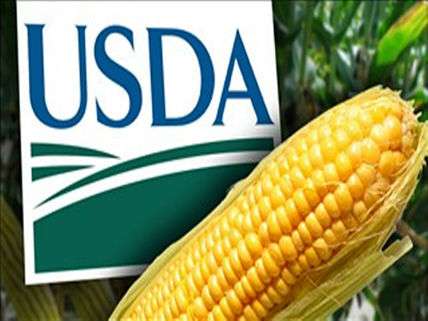USDA Certifies Corn as 'Officially Sacred' Say Activists
Despite the NPR story's claim, the agency has no more certified Ponca corn as sacred than it has Roundup Ready corn

I woke up to a puzzling local NPR story about the Atlantic Coast Pipeline earlier this week. The pipeline is supposed transport natural gas from the fracking fields of Appalachia. Lots of folks in central Virginia, especially in Nelson County are very much opposed to its construction. Some claim that it will be dangerous and will contribute climate change while others object to using eminent domain to acquire the land for the pipeline's right-of-way. I have my own views about the controversy, but that's not what has provoked this post. As part of the protest against the pipeline local activists have invited members of the Cowboy and Indian Alliance from Nebraska to offer them guidance and participate in public protests. The Alliance is part of the Bold Nebraska activist movement against the Keystone Pipeline. All to the good - just folks exercising their First and Fifth Amendment rights. What caught my attention was the following claim in the NPR segment …
…the Cowboy and Indian Alliance formed in Nebraska, their strategy of resistance to fossil fuels is to plant sacred seeds in the path of proposed pipelines.
"And I'm going to pray to the 4 winds, the 4 directions, asking the creator to help us with this fight that we're taking on now; to give us strength to give us guidance."
Mekasi Horinek, got those seeds certified by the U.S. Department of Agriculture as officially sacred. The hope and prayer is that reverence for that distinction stops transmission lines like the Mountain Valley Pipeline proposed for this narrow hollow here in Elliston, Virginia.
"I'm going to call the spirits of and ask the ancestors that were here before. I'm going to ask them to be with us today to help us and guide us." …
When this sacred corn grows in a few weeks, it won't be mistaken for just any breed. Its stalks will not look like the uniform rows of the modern varieties. Some will be tall, some short and their bright blue ears just as randomly placed. The Ponca Indians believe the creator gave this corn to them not only as food, but also as medicine.
Their last crop was already planted when they were removed from their land and sent west in 1876. But the saved seeds were found, planted tested and certified in 2014 as part of a plan to sow them before the all the proposed fossil fuel pipelines in the country.
Got those seeds certified by the U.S. Department of Agriculture as "officially sacred"? Talk about seed purity standards!
Startled by the claim that federal government functionaries are now in the business of discerning and certifying the spiritual qualities of crops, I did a little digging around on the internet. It appears that the claim that the Ponca corn has been certified as sacred by the USDA stems from the fact that Nebraska farmer Art Tanderup first planted the seeds on his land. As part of the U.S. government's crop insurance scheme farmers must fill out and send in a FSA Form 578. This report of acreage form merely tells the Farm Service Agency on how much land a farmer has planted what type of crop.
An article about the Ponca corn over at the Bold Nebraska activist website notes that Tanderup "certified the corn with the USDA to ensure that there is a formal record." And sure enough, the article displays a copy of the filled-out FSA Form 578 as evidence (see above). On the form Tanderup has noted the field and tract numbers and characterized the planted crops as "Sacred Blue Corn." In other words, despite the claims in the NPR segment, the USDA has no more certified Ponca corn as sacred than it has Roundup Ready corn varieties. The only official notice of the "sacred corn" that the USDA may take is if Tanderup files an insurance claim due to its destruction by an Act of God.
Still, the activists did plant Ponca corn on the right-of-way of the Keystone pipeline and where is it now?


Show Comments (39)